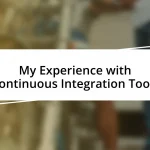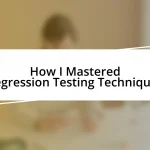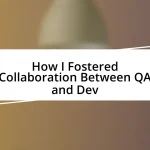Key takeaways:
- Understanding core JavaScript concepts, such as variables, functions, and objects, provides a solid foundation for coding confidence and problem-solving.
- Utilizing online resources, engaging with communities, and practicing through real projects enhance learning and foster collaboration, making the coding journey enjoyable.
- Maintaining a growth mindset allows coders to embrace challenges and failures as learning opportunities, ultimately leading to personal and technical growth.

Understanding JavaScript Basics
JavaScript basics can be incredibly empowering once you start to grasp the core concepts. I remember my first encounter with variables – it felt like magic! Being able to store data and manipulate it made me realize that I was not just typing into a void; I was building something.
Functions are another fundamental piece of the puzzle. When I first learned to write a function, it was like discovering a superpower; I could create reusable code that simplified complex tasks. Have you ever experienced that “Aha!” moment when everything clicks? It’s exhilarating and enhances your confidence as a coder.
Then there are objects, which are essential for organizing data in a meaningful way. I used to visualize objects as little boxes filled with attributes and methods, which made it much easier to understand how they work. Who knew that understanding the structure of JavaScript would transform how I approached coding challenges?

Building a Solid Foundation
Building a solid foundation in JavaScript is crucial for anyone looking to master the language. I vividly recall the time when I first stumbled upon data types. Understanding the difference between strings, numbers, and booleans felt like deciphering a code; each had unique behaviors and roles. Gaining clarity on these fundamentals helped me avoid common pitfalls later in my coding journey.
As I dove deeper, I realized that mastering control flow was like learning to navigate a map. Conditions and loops allowed me to direct the path of my code based on varying inputs. The first time I successfully implemented a loop to automate tasks, I felt an overwhelming sense of accomplishment. It highlighted how powerful code can be in handling repetitive actions with ease.
Moreover, it’s critical to recognize how environmental context, like the browser’s console, aids learning. I often experimented in the console during my early days, playing with snippets of code until concepts crystallized in my mind. Each test and minor success fueled my curiosity, pushing me further into the vast world of JavaScript.
| Concept | My Experience |
|---|---|
| Data Types | Felt like unlocking a secret key to understanding behaviors in code. |
| Control Flow | Navigating through conditions made me feel like a coder in control. |
| Environmental Context | Using the console as my playground helped solidify my understanding. |

Utilizing Online Resources Effectively
Utilizing Online Resources Effectively
Leveraging online resources has been a game-changer in my JavaScript journey. I remember diving into YouTube tutorials, where engaging instructors brought concepts to life through hands-on examples. It wasn’t just about passive viewing; I found myself coding along, and that interactive experience solidified my understanding. When you can echo what you’ve learned, it truly transforms theory into practice.
Another valuable resource has been coding forums and communities. The feeling of discussing problems with others who share similar challenges is invigorating. Often, their fresh perspectives helped me see solutions I might have missed. Here are some effective strategies I’ve learned to maximize these online resources:
– Engage Actively: Join discussions, ask questions, and provide answers when you can.
– Follow Structured Paths: Utilize platforms with guided tracks that build progressively, like freeCodeCamp or Codecademy.
– Take Notes: Summarizing key points while watching videos or reading articles reinforces my memory.
– Practice Regularly: Frequent coding exercises reinforce my learning and boost my confidence.
– Explore Different Formats: Mix up learning methods – from videos to blog posts and interactive coding challenges.
These approaches have not only enhanced my learning but have also made the process enjoyable and engaging!

Practicing with Real Projects
Practicing with real projects was a turning point for me in mastering JavaScript. I distinctly remember the thrill of building my first web application from scratch. It wasn’t a grand, complex project, just a simple to-do list. Yet, seeing my code come to life felt like magic. That experience cemented my understanding, as it forced me to confront practical problems and seek creative solutions.
As I took on more challenging projects, I often encountered obstacles that pushed me to think critically. One time, while developing a weather application, I had to manage API calls and handle asynchronous code. It felt daunting at first, but I learned the importance of debugging and testing. Solving those issues not only sharpened my skills but also instilled a deep sense of resilience. Isn’t it amazing how the hurdles we face can lead to profound learning?
Additionally, collaborating with others on projects opened up a whole new world for me. I participated in a small group project where we built a simple game together. It was fascinating to witness different coding styles and problem-solving approaches. I found that discussing ideas and reviewing each other’s code provided insights I might not have discovered alone. Have you ever considered how collaboration could elevate your learning? For me, it underscored that mastery of JavaScript isn’t just about individual skill; it’s about community and shared knowledge.

Joining Coding Communities
Joining coding communities has been a pivotal part of my JavaScript journey. I remember the first time I joined an online forum, feeling nervous but excited. It was such a relief to find others who were equally passionate about coding. Engaging in discussions was like a breath of fresh air; I learned as much from others’ questions as I did from my own. Have you ever felt that sense of belonging among fellow learners?
As I interacted more within these communities, I found that sharing my struggles often led to surprisingly constructive conversations. I recall posting about a bug that had me stumped for days, and the quick responses from experienced coders made me feel supported. The best part? Those shared solutions not only fixed the problem but also deepened my understanding of the concepts involved. I discovered that these communities are treasure troves of insights, where collaboration can illuminate paths I hadn’t considered before.
Furthermore, attending meetups and coding events has been an exhilarating experience. I still get a rush thinking about my first local JavaScript meetup; the energy in the room was infectious! Networking with others, exchanging ideas, and learning about different projects broadened my horizons. Have you thought about stepping out from behind your screen to meet fellow coders in person? It transformed the way I approach my coding projects, reminding me that community fuels growth and creativity—both essential in mastering JavaScript.

Learning Advanced Concepts
When I decided to dive into advanced JavaScript concepts, it was both exhilarating and intimidating. I vividly remember sitting in front of my code editor, grappling with the intricacies of closures and higher-order functions. At the time, these concepts felt abstract and distant. Have you ever struggled with something that seemed out of reach? I eventually turned to online courses, which introduced these topics in such a relatable way, breaking them down into bite-sized pieces. This made them feel accessible, and it was the moment my understanding began to shift.
Experimenting with frameworks like React and Node.js took my skills to another level. I clearly recall building my first component and how the reactivity of the user interface made me feel accomplished. It was a turning point when I realized that advanced concepts weren’t just theoretical—they were tangible tools I could wield to create something meaningful. In those moments, I learned that the joy of coding comes not just from learning, but from applying those concepts in real-world scenarios. Have you tried diving into a framework that excited you? The thrill of seeing your work come to life can be addictive.
Reflecting on the power of mentorship during this journey, I found it invaluable as I tackled these advanced concepts. I once had a mentor who guided me through understanding asynchronous programming, patiently breaking down the concepts of promises and async/await. It was during one of our sessions that I had a light bulb moment, where everything clicked into place. Isn’t it incredible how a single conversation can reshape your understanding? This reinforced my belief that seeking out mentors or even studying alongside peers can provide clarity and enhance our learning experience, transforming complex topics into understandable challenges.

Maintaining a Growth Mindset
Maintaining a growth mindset has been a game changer in my coding journey. I recall a time when I hit a particularly challenging bug. At first, it felt like a roadblock. But instead of seeing it as a failure, I chose to view it as an opportunity to learn. Embracing this perspective allowed me to approach the problem differently, almost like a puzzle waiting to be solved. Have you ever found yourself stuck, only to realize that it’s a chance to grow?
What’s interesting is how my mindset shifted the more I practiced this approach. I vividly remember celebrating small victories—like finally grasping the significance of this in JavaScript. Initially, it was just a confusing term thrown around, but once I got it, my confidence soared. Each realization fueled my enthusiasm, proving that growth is much more than mastering syntax or concepts—it’s about the journey of understanding. Can you think of a moment that changed your perspective on learning?
Connecting this mindset to daily practice has also led me to embrace failure as part of the process. I’ll never forget when I attempted to build my first full-stack application. The first deployment was a total mess! Instead of feeling defeated, I documented every misstep and how I resolved them. Each failure became a lesson, and that’s when I truly embraced growth. Have you documented your own journey? It’s comforting to look back and see how far you’ve come through persistence and a positive outlook.














